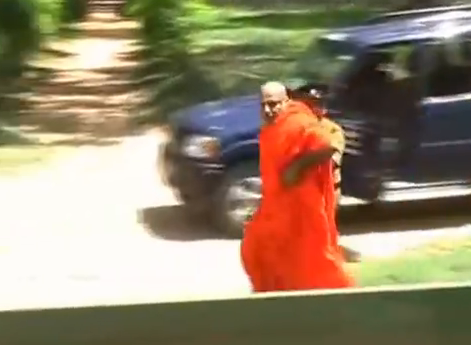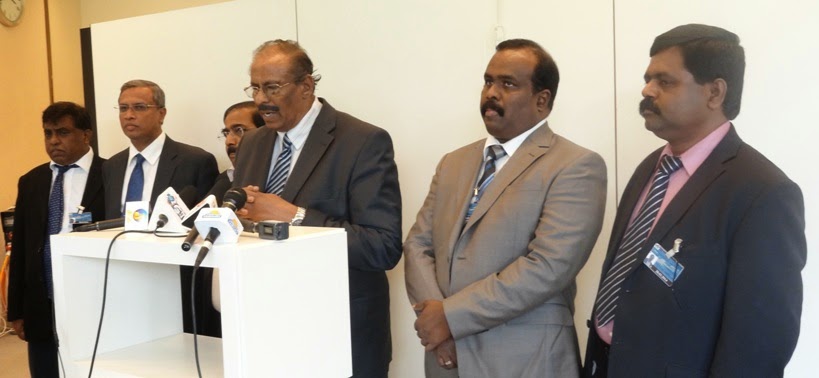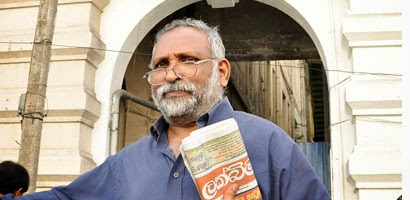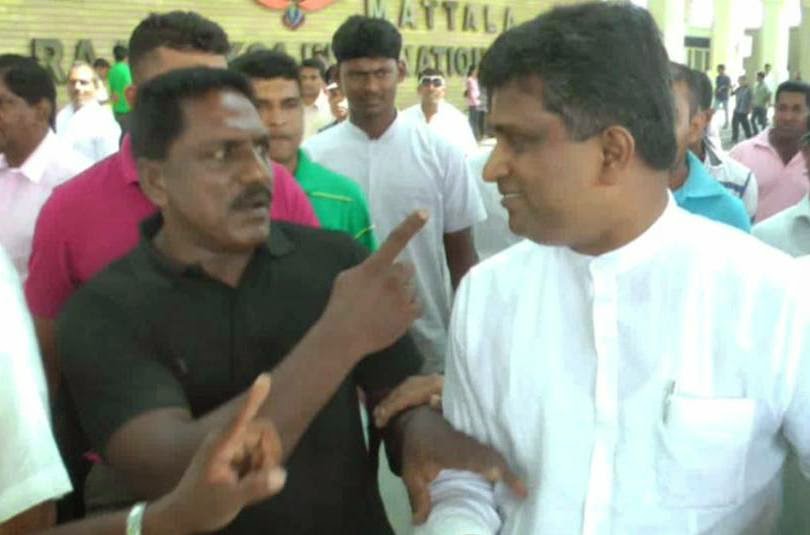”Government Ministers, MPs, politicians, supporters and groups backed by the government appeared to behind almost all the reported incidents. On several occasions, Police watched by and refused to take action as these government politicians and allies attacked and threatened opposition politicians, journalists and a prominent Buddhist Monk advocating for religious freedom and harmony. As in previous months and years, there appears to be no interest and urgency in conducting investigations and prosecuting those responsible, despite the availability in some cases of ample evidence including eyewitness accounts, video and photographic evidence, most of which are in the public domain’‘
Repression of Dissent
in Sri Lanka
April 2014
Journalists covering the opposition MPs inspection tour of two mega development projects in
Hambantota are being hit by eggs aimed by ruling party supporter
while helpless policemen look on (photos : Lankadeepa)
A. Threats to arrest those advocating accountability for alleged War Crimes
B. Attacks & restrictions on Freedom of Expression
C. Threats and restrictions on Freedom of Association
D. Repression of University Student Activists
E. Threats to a human rights defender promoting religious freedom
F. Restriction on a human rights defender to visit prisoners
G. Suppression of opposition political parties
Summary
April began with the government having to deal with the resolution of the UN Human Rights Council (UNHRC), condemning it’s rights record and establishing an international investigation mechanism into allegations of war crimes. The day after the UNHRC resolution, the government had decided to hold two provincial elections with the aim of harnessing public support after the UNHRC resolution. However, the government lost ground in the politically & economically significant Western province (including the capital Colombo) and also in the Southern province, the hometown of President Rajapakse and his family and stronghold of the ruling coalition which had seen the bulk of the major infrastructure projects in last few years. In the North, the government claimed to have killed in a shootout, three Tamil men, who were accused of trying to revive terrorism. 69 persons, most of them Tamils, had been arrested in relation to the government’s search for these men. While 24 were reported as having being released, 45 were reported to be in detention as of 4thMay 2014, including Ms. Jeyakumari, a prominent campaigner on enforced disappearances.
Repression of dissent continued in April with opposition parliamentarians from the major opposition United National Party (UNP) attacked. The major Tamil party, the Tamil National Alliance (TNA) the Catholic Bishop of Mannar and Ven. Watarekke Vijitha Thero, a Buddhist Monk also continued to be targeted. Military and the government continued to attack Tamil journalists in the North as well as Sinhalese journalists in the South, while the BBC correspondent’s request for a year’s visa extension was refused citing policies that didn’t seem to exist. Calling for accountability into allegations of war crimes also continued to invite intimidation and threats while the military had also resorted to new forms of intimidating Jaffna university students. The President was reported to have announced plans to draw up new laws to monitor and control NGOs while the government publicized names of 16 Tamil organizations and 424 Tamil persons, based overseas as those supporting terrorism, without any evidence. While some of the organizations appeared to be sympathetic to the LTTE, others have been calling for accountability into allegations of war crimes by the government and the LTTE.
Government Ministers, MPs, politicians, supporters and groups backed by the government appeared to behind almost all the reported incidents. On several occasions, Police watched by and refused to take action as these government politicians and allies attacked and threatened opposition politicians, journalists and a prominent Buddhist Monk advocating for religious freedom and harmony. As in previous months and years, there appears to be no interest and urgency in conducting investigations and prosecuting those responsible, despite the availability in some cases of ample evidence including eyewitness accounts, video and photographic evidence, most of which are in the public domain.
A. Threats to arrest those advocating accountability for alleged war Crimes
1. Parliamentarians and a Provincial Councilor from the Tamil National Alliance
Addressing a media conference on 10th April, Government Coalition party Jathika Hela Urumaya (JHU) Media Spokesman and Western Provincial Councilor Mr. Nishantha Sri Warnasinghe called for immediate arrest of Northern Provincial Council member Ms. Ananthy Shashidaran, two Members of Parliament of Mr. Suresh Premachandran and Mr. M.A. Sumanthiran. All three of them belong to the Tamil National Alliance. The JHU wants to arrest them for their participation of 25thsession of UNHRC in March 2014 and campaigning for an international investigation on war crimes in Sri Lanka.[1]
TNA MPs speaking to media at Place des Nations on 26th March 2014; Both Mr. Suresh Premachandran and Mr. M.A. Sumanthiran participated in the briefing (photo:S.Deshapriya)
2. Bishop Rayappu Joseph
Bodu Bala Sena (Buddhist army – a militant and extremist Buddhist group) challenged the Government to arrest the Catholic Bishop of Mannar, Rt. Rev. Dr. Rayappu Joseph. They alleged that the Bishop had supported the LTTE.[2]But real reason appeared to be the Bishop’s consistent stand on Tamil’s right to internal self-determination within a united Sri Lanka, his demand for an international investigation to investigate allegations of war crimes by the government and the LTTE and his strong public criticism of the government’s human rights record.
3. Those cooperating with the international investigation to be set up by UN OHCHR as per the UNHRC resolution
According to a report in the “Ceylon Today” newspaper, the Minister of Mass Media, Mr. Keheliya Rambukwella had stated that legal actions would be taken against those who testify before the international investigation mechanism established by the UN Human Rights Council, if evidence submitted is in violation of the country’s constitution[3]. He further said that Members of the Parliament cannot testify before this mechanism, as it will be a violation of the sovereignty of the country. The “Ceylon Today” newspaper report also quoted media reports that had reported that testifying before the “international committee” would be treason and that the government would initiate legal action aganst such individuals under the “State Secret Act” and that measures will be taken to debar such persons from making international calls and video conferences. Minister Rambukwella had refrained from commenting on a clampdown on communication.
B. Attacks & restrictions on Freedom of Expression
4. Tamil newspapers: new censorship proposed
In an interview given to a Sri Lankan newspaper Dr. Rohan Gunarathna stated that “The worst is over but remnants seeking to regroup and activities of LTTE proxies should be closely observed. To prevent propaganda from being published, the editors of Tamil newspapers should be held accountable for publishing disinformation and misinformation.” [4]
Mr. Gunarathana is the head of the International Centre for Political Violence and Terrorism Research (ICPVTR)] at Nanyang Technological University in Singapore and a frequent resource person at the Ministry of Defense functions. His comments were made in the context of listing Tamil Diaspora organizations and allegations of attempt to review the activities of LTTE in Sri Lanka. This is likely to have been made in the context of Tamil media often exposing allegations of government abuses during and after the war, often said to be done in course of counter terrorism initiatives. It appears to be a threat to Tamil media and cow them towards complete submission, as some of them continue to publish news and views critical of the military, despite numerous attacks.
5. Tamil newspapers in the North: Military dictates stories
The military has requested Tamil language newspapers in the Northern region to publish the victory of the Sri Lankan cricket team, at the T20 Cricket World Cup as their lead story. On 7th April a military officer has phoned newspaper officers in the area, requesting to take up the story as the publications’ lead.[5]This is clearly an interference in editorial independence and can be seen as a form of intimidation in context of heavy militarization in the region and history of abuses against the media in the region.
6. Mr. Sivagnanam Selvatheepan: journalist assaulted
A Tamil freelance journalist, Mr.Sivagnanam Selvatheepan, was attacked on 14thApril in Vadamarachi, in the Northern Jaffna district. He was on his way home when two unidentified persons following him in on a motor bicycle attacked him. He has been a correspondent of Tamil Daily newspapers Veerakesaree and Thinakkural published in Colombo. He was seriously injured and was admitted to hospital for treatment and a police complaint had been lodged.[6]
7. Mr. S.V. Sivakaran and ‘Puthiyavan’ newspaper: threats including death
A group led by a ruling coalition UPFA provincial councilor, entered the office of the ‘Puthiyavan’ newspaper in Mannaar on 10th April and issued death threat to its editor Mr. S.V. Sivakaran. The office is located at Chinnakadai on Mannar main road. Mr. Sivakaran is also the leader of the youth wing of the opposition Tamil political party Ilankai Thamizh Arasuk Kadchi (ITAK). The group threatened to block the distribution of the newspaper and to set fire to the office according to the editor’s statements to media. Puthiyavan is a recently launched Tamil newspaper in the northern district of Mannar.[7]
8. Mr. Saman Wagaarchchi: editor questioned by police
Chief Editor of theLakbima newspaper Mr. Saman Wagaarchchi was summoned and subjected to lengthy questioning by the Criminal Investigation Department (CID) on 9th April 2014 on the issue of a caption of a photo related to Mrs. Anoma Rajapaksa, wife of the Secretary to the Ministry of Defense and brother of the President. Issuing a statement the Lawyers for Democracy said “It is a revelation of the situation in the country today. The Editor of a newspaper is called before the CID on a trivial matter while serious cases of violations of fundamental rights and attack on civilians in violation of the Rule of Law passes by without at least a comment from those in power. We condemn this move as it is in our view another incident of intimidation of the media to suppress the freedom of expression and to hold the media by its throat.”[8]
Saman Wagaarchchi, Chief editor Lakbima, forced to resign
9. Mr. Sujith Prasanga, newspaper Sub-Editor: dismissed for political reasons
The “Lakbima” newspaper management dismissed Mr. Sujith Prasanga, a Sub-Editor of the newspaper, for writing a caption to a photograph of the Secretary to the Ministry of Defense (also brother of the President), Mr. Gotabaya Rajapakse’s wife. The photograph showed the wife purchasing some goods from a stall at the New Year fair organized by the “Seva Vanitha” unit of the Department of Civil Defense. The newspaper was forced to make two apologies, on 7th and 9th April.[9]According to Sri Lanka Working Journalists Association (SLWJA) it was a satirical picture headline: ”The tongue- in- cheek photo headline read as “ Hora Salli Nemeine”, which can be loosely translated into English as “ not fake notes, right?”[10] SLWJA expressed its concerns on ‘the powers- that- be in the incumbent administration who believe that satire directed at them deserves to be investigated by the Criminal Investigation Department.’
10. Journalists: attacked and chased away
Journalists who went to cover a visit by a group of opposition United National Party (UNP) Members of Parliament (MPs) who were visiting the Magampura Port, Hambantota (newly built port in Sinhalese majority Southern Province, which is the hometown of President Rajapakse) were threatened, pelted with eggs and chased away by a mob that included a pistol yielding government politician, who was the Mayor of the area.[11]The MPs later abandoned the inspection tour as the mob became increasingly violent. Video as well as photographic evidence were published by the media on thugs attacking, intimidating, threatening and chasing away the group of MPs and the journalists. [12]
11. Mr. Charles Haviland, BBC correspondent: visa extension refused
The government had refused to extend the working visa for the BBC correspondent in Colombo, Mr. Charles Haviland for one year, as per his request. He was initially given a few days visa extension to wrap up his work on Sri Lanka. Upon the intervention of some senior foreign journalists based in Colombo he was provided a three months extension. Charles Haviland, has been in Sri Lanka since April 2009, and has reported extensively on human rights and post war issues in the country.[13] Secretary to the Media Ministry Dr. Charitha Herath was reported by media as saying “Mr. Haviland’s current status was the result of a visa policy that said foreign correspondents could stay in Sri Lanka a maximum of five years.” But he was not able to explain when and where the five year policy was established and enforced. Mr. Herath has said that ‘he needed to check that with the Ministry of External Affairs (MEA) … while the policy was with the Media Ministry, it was implemented by the MEA.’ When asked a spokesman for the MEA asked, had replied: “I am not aware. I think according to the Media Ministry there is. You have to check with the Secretary of that Ministry. I presume there is such a policy.” [14] Refusal to provide direct answers, passing the responsibility to other Ministries and refusal to divulge the details of an alleged policy which doesn’t seem to exist appears to indicate that the refusal of the BBC correspondent’s visa is a political decision due to his criticism of the government, which indicates a bad precedent for media freedom.
12. Ven. Watarekke Vijitha Thero and others: press conference attacked
A mob led by Bodu Bala Sena (Buddhist army – a militant and extremist Buddhist group) disrupted the inaugural press conference organized by the ‘Jathika Bala Sena’ led by senior Buddhist Monk, Venerable Watareka Vijitha Thero, on 9th April.[15]Vijitha Thero has been attacked and threatened for defending rights of religious minorities and advocating for inter-religious harmony by the BBS.[16]Number of TV stations broadcasted video footages of the unruly behavior of the Bodu Bala Sena monks threatening, intimidating and almost assaulting Ven. Vijitha Thero and shouting at a Muslim cleric to shut up. [17]The Police officers present didn’t attempt to stop the invasion and disruption of the press conference, and threats and vilification of Vijitha Thero and Muslim clerics present.
C. Threats and restrictions on Freedom of Association
13. NGOs: Fears of witch-hunt through new laws to monitor NGOs
The President is reported to have revealed plans to formulate new laws to monitor funds received by local Non-Governmental Organizations (NGOs) in a meeting with editors on 24th April. ‘The proposed laws should not lead to a witch-hunt or aim to suppress democratic activism of the NGOs. That is however, a moot point. Given the past track record of the government, even the most genuine NGO activists would have grave reservations about the government’s intentions. We cannot help, but share those sentiments’ said an editorial of the Ceylon Today.[18]
14. Tamil Diaspora organizations and individuals and Sri Lankans contacting them
On April 4, 2014, External Affairs Minister, G.L. Peiris made public an order signed on March 20 by the Secretary to the Ministry of Defense, listing 15 overseas Tamil organizations and the militarily defeated LTTE[19]. It appears to aim at freezing the assets and financial resources of these 16 organziations. According to Human Rights Watch, “the Sri Lankan government’s decision (is) … so broad that it appears aimed at restricting peaceful activism by the country’s Tamil minority.[20]” Further it said that “the government should provide evidence of the unlawful activity of specific groups and individuals or remove them from the list.” Sri Lanka’s own United Nations Regulation No. 1 of 2012[21]is derived from UN Security Council Resolution 1373 (2001), passed in the wake of the 2011 September 11 attacks on the United States, and requires countries to freeze assets and entities of those “who commit or attempt to commit terrorist acts or participate in or facilitate the commission of terrorist acts.”
According to the Global Tamil Forum (GTF), one of the listed organizations, “the Government of Sri Lanka’s decision to proscribe sixteen Tamil diaspora organizations and four prominent Tamil diaspora activists, including and GTF President Rev. Dr S.J. Emmanuel, as ‘foreign terrorist entities’ is an attempt of ‘intimidating and silencing those who demand truth, justice and accountability for the alleged war crimes committed during Sri Lanka’s armed conflict and for the on-going perpetration of human rights abuses.”[22]
D. Repression of University Student Activists
15. Jaffna University Students: intimidation by the military
Issuing a statement on 25th April the Student Union of University of Jaffna said that military has been conducting extensive searchers of the male students’ hostels. “That the security forces – who have been repressing all our rights to freedom of expression under the excuse of terrorism – are entering and searching without any apparent reason has created fear among the students.” [23]. This search appears to be aimed at intimidating the university students, who have challenged and criticized the government in the past.
E. Threats to a human rights defender promoting religious freedom
16. Ven. Watarekke Vijitha Thero: attempts to stop attending a meeting
On 22thApril Bodu Bala Sena organized another protest outside the Mahiyanganaya Pradeshiya Sabha against the Venerable Vijitha Thero. Vijitha Thero is an elected member of the Pardeshiya Sabha (Local government body) from the ruling United Peoples Freedom Alliance (UPFA). The Police had to escort Vijitha Thero inside the Pradeshiya Sabha building following fears the protesters may attack the monk.[24]A YouTube video available on the internet shows Watarekke Vijitha thero running out of fear, escorted by the police.[25]
Watarekke Vijitha Thero run for his life as Bodu Bala Sena mobs shouting against him (9 April 2014) – (screen shot. you tube video)
17. Ven. Watarekke Vijitha Thero: hunted
On 24thApril, an unruly mob consisting some Buddhist monks from the Bodu Bala Sena forcefully entered the office of Ministry of Industry and Commerce and searched room by room to find out whether Vijitha Thero is hiding there. The Minister, who is a Muslim, was not in the Ministry at the time of raid. The monks left only after the Ministry officials and the police assured the BBS that Vijitha Thero was not in the building. [26]
F. Restrictions on a human rights defender to visit prisoners
18. Mannaar Bishop: denied conducting religious service & meet Tamil Prisoners
The Catholic Bishop of Mannar was blocked from conducting an Easter service and meeting with Tamil prisoners in the Anuradhapura prison by “higher authorities in Colombo”, according to the Catholic Bishop of Anuradhapura, despite the Minister of Prisons, Mr. Chandrasiri Gajadheera, having being aware of the visit[27]. The Anuradhapura Bishop has further stated that prison authorities had earlier given instructions to Tamil prisoners that they should not speak to the Bishop of Mannar for too long nor give him anything in writing.
According to Tamilnet, the visit had been blocked at the last minute by an order form the Ministry of Defense, on 20th April, despite permission having been obtained for the visit from the Minister of Rehabilitation and Prison Reforms in Colombo Mr Chandrasiri Gajadeera.[28]The Bishops were to visit around 60 Tamil political prisoners and to deliver a message of hope and some basic assistance on the Easter Sunday.[29]The Bishop of Mannar is a prominent human rights defender within the Northern Tamil community, who has been regularly visiting Tamil political prisoners, and has been vocal in calling for their early release if they are not being charged with credible evidence. He has made representations to government Ministers and the Lessons Learnt and Reconciliation Commission. “There are stonehearted persons and officials in the country of Ilankai (Sri Lanka) today. That is why reconciliation between Sinhala and Tamil people still seems far away. These personalities need to change evolving their attitude into a positive one, abandoning their bad deeds and start to respect human beings, be it Tamil prisoners or others, if the country is to embark on a path towards reconciliation” the Mannar Bishop said.[30]
G. Suppression of opposition political parties
19. Opposition MPs: Attacked, threatened and stopped from a fact finding mission
A group of opposition United National Party (UNP) members of parliament (MPs) who were visiting the Magampura Port, Hambantota (newly built port in Sinhalese majority Southern Province, which is the hometown of President Rajapakse) were threatened and pelted with eggs by a mob that included a pistol yielding government politician, who was the Mayor of the area.[31]The MPs has to abandon the inspection tour as the mob became increasingly violent. Video as well as photographic evidence were published by the media on thugs intimidating, threatening and chasing away the group of MPs. [32]President Mahinda Rajapaksa has put the attack down to ‘public anger’ over the unjust attacks on the Government’s development projects in the area. The state controlled media has defended the assault as nothing more than democratic dissent.[33]
Speaking at a press conference the five parliamentarians who came under attack denied the President’s allegation and said that ” “No UNP parliamentarian ever said that and we did not make such a comment either. We said the projects were being conducted in a fraudulent manner and that it would be conducted in a transparent manner under the UNP” [34]
A ruling party supporter warns UNP MP Mr. Ajith Perera within the Mathala airport premises (photo; Daily Mirror)
The attack on UNP MPs generated a major political discussion in the country with all three English daily papers (excluding the government run Daily News) published hard hitting editorials, calling for justice and fair play. (The horror of the ‘Hambantota doctrine’ by Daily Mirror[35]; Thugs and toys by The Island[36]; A slap on the face of parliamentary democracy by Ceylon Today.[37]).
[1] http://www.hirunews.lk/81026/jhu-says-3-tna-members-should-be-arrested (Last accessed 19th May 2014)
[2] http://www.island.lk/index.php?page_cat=article-details&page=article-details&code_title=102041 (Last accessed 19th May 2014)
[3] http://www.ceylontoday.lk/51-61100-news-detail-govt-warns-against-testifying-before-unhrc-inquiry.html (Last accessed 19th May 2014)
[4] http://www.nation.lk/edition/interview/item/28174-ltte-overseas-network-should-be-dismantled-prof-gunaratna.html (Last accessed 19th May 2014)
[5] https://www.srilankamirror.com/news/14339-north-newspapers-asked-to-take-cricket-win-as-lead-news (Last accessed 19th May 2014)
[6] http://colombogazette.com/2014/04/15/tamil-journalist-attacked-in-jaffna/ (Last accessed 19th May 2014)
[7] http://www.tamilnet.com/art.html?catid=13&artid=37163 / http://goo.gl/UMyG30 (Last accessed 19th May 2014)
[8] http://www.ft.lk/2014/04/26/lawyers-for-democracy-condemn-the-harassment-of-lakbima-editor/ (Last accessed 19th May 2014)
[10] http://lankanewsweb.net/news/7246-the-cid-questioning-of-lakbima-editor-saman-wagarachchi (Last accessed 19th May 2014)
[13] http://colombogazette.com/2014/04/19/bbc-correspondent-refused-a-visa/ (Last accessed 19th May 2014)
[14] http://www.sundaytimes.lk/140420/news/bbcs-haviland-has-to-go-says-govt-93255.html (Last accessed 19th May 2014)
[15] http://colombogazette.com/2014/04/09/bbs-abuse-monk-and-muslim-cleric/ (Last accessed 19th May 2014)
[17] https://www.youtube.com/watch?v=pcbhAGG4VCM (Minutes 1.56 onwards – last accessed 19th May 2014)
[18]http://www.ceylontoday.lk/52-62465-news-detail-new-laws-against-ngos-should-not-be-a-witch-hunt.html (Last accessed 19th May 2014)
[19] http://www.hrw.org/news/2014/04/07/sri-lanka-asset-freeze-threatens-peaceful-dissent and for the actual gazette, see http://documents.gov.lk/Extgzt/2014/PDF/Mar/1854_41/1854_41%20(E).pdf (Last accessed 19th May 2014)
[20] http://www.hrw.org/news/2014/04/07/sri-lanka-asset-freeze-threatens-peaceful-dissent (Last accessed 19th May 2014)
[21] http://fiusrilanka.gov.lk/docs/UNSCR/Regulations/1758/1758_19_(E).pdf (Last accessed 19th May 2014)
[22] https://www.srilankabrief.org/2014/04/banning-tamil-diaspora-groups-in-sri.html#more (Last accessed 19th May 2014)
[23]See http://globaltamilnews.net/GTMNEditorial/tabid/71/articleType/ArticleView/articleId/106072/language/ta-IN/article.aspx for statement in Tamil and http://www.eyesrilanka.com/2014/04/26/jaffna-uni-students-union-condemns-search-of-residence/ for article quoting the statement in English (Last accessed 19th May 2014)
[24] http://colombogazette.com/2014/04/22/massive-demo-against-vijitha-thero/ (Last accessed 19th May 2014)
[26] http://colombogazette.com/2014/04/23/bbs-mob-storms-rishads-ministry/ (Last accessed 19th May 2014)
[27] https://www.srilankabrief.org/2014/05/sri-lanka-there-are-reasons-to-beleive.html (Last accessed 19th May 2014)
[29] ibid
[30] ibid
[33] https://www.srilankabrief.org/2014/04/mob-rule-and-hambantota-doctrine.html#more (Last accessed 19th May 2014)
[35]http://www.dailymirror.lk/opinion/172-opinion/46082-the-horror-of-the-hambantota-doctrine-editorial.html (Last accessed 19th May 2014)
[36] http://www.island.lk/index.php?page_cat=news-section&page=news-section&code_title=55 (Last accessed 19th May 2014)
[37]http://ceylontoday.lk/52-61908-news-detail-a-slap-on-the-face-of-parliamentary-democracy.html (Last accessed 19th May 2014)





